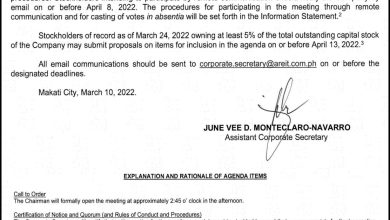Cash is king but not for long

In the Philippines, there is still a general preference for cash to pay for things. Cash is still king, for now. But this may no longer be the case in the coming years given the evolving landscape of digital payments and technology adoption among Filipino consumers. The recently released Visa Consumer Payment Attitudes study sheds light on this.
Apparently, the payment behaviors of Filipino consumers are changing, perhaps also as an offshoot of community quarantines, as well as health protocols during the COVID-19 pandemic from 2020 to 2023. There is a gradual but obvious shift toward electronic modes of payment, indicating growing acceptance and adoption of digital solutions.
The main drivers of this are said to be convenience, security and technological advancements. Personally, I perceive a broader adoption of digital technology, with digital solutions increasingly playing a greater role in everyday life. High technology is becoming more integrated into various aspects of society including finance, education and work.
Smart phones with data connection have practically become an “attachment” of the human anatomy. The ability to use technology is being matched by a more proactive attitude toward embracing its potential and exploring new possibilities. Digital technology is transforming industries and work patterns and is changing consumer behavior through online purchases and e-wallet usage, among other things.
The latest annual Visa Consumer Payment Attitudes study was based on interviews from October to November 2023, covering 1,000 Filipino consumers aged 18-65 across various cities, regions and income brackets, with a minimum monthly income of P12,000.
The study noted that Filipino consumers still preferred cash for everyday transactions including retail purchases, dining out and transportation. But digital payment methods like mobile wallets or e-wallets are gaining traction especially among younger consumers and urban dwellers. Contactless payments or tapping or waving credit or debit cards or smartphones at POS terminals are also on the rise.
Visa noted that cash usage in the Philippines dropped to 87% in 2023 from 96% in 2022. Filipino consumers also spent an average of 10 days without cash without any issues or concerns. The use of card payments including swipe and insert, online and tap-to-pay and contactless payments reached 70% in 2023, while mobile wallet usage hit 87%, matching cash transactions.
Survey results also showed that 43% of Filipinos now carry less cash in their wallets, while there was an increased adoption of cashless payment methods among leading merchant categories including supermarkets, food and dining, and bill payments. There are also more payment solutions now available and more accessible to consumers.
The Visa study also showed that 9 of 10 Filipinos were aware of and interested in using contactless cards and QR codes for their transactions. Specifically, 32% of Filipinos used contactless cards in 2023, driven primarily by the affluent population. Also, 55% used QR codes, with over 50% adoption across age groups except for consumers aged 59-65 (31%).
And among mobile wallet users, QR code payments emerged as the preferred method for 38% of consumers, establishing mobile wallets as the favored funding source for QR payments. In-store QR code scanning was the preferred mode of payment for 78% of users, Visa said in a statement.
Also revealing was the finding that 52% of consumers were OK with going cashless and relying solely on cashless payment methods for at least a week. And that more than a third of the consumers surveyed, or around 37%, thought the Philippines would become a cashless society by 2030, if not sooner.
Among travelers, cards were preferred for cross-border payments, with 55% favoring debit and credit cards for their convenience, time-saving benefits and hassle-free experience. Also, 37% of Filipinos were aware of and willing to try the use of QR codes for cross-border payments.
What favors cash, for now, are factors that include limited access to banking services, concerns about security and fraud and a lack of awareness about digital alternatives. On the other hand, what favors electronic channels are the widespread use of smartphones, the expansion of internet connectivity and the emergence of financial technology solutions. Many consumers still prefer contactless transactions to mitigate health risks.
Today, cash still holds a dominant position in the realm of payments, earning its reputation as the reigning monarch of financial transactions. It retains its throne, but its grip is loosening. The landscape is rapidly evolving, spurred by technological advancements, shifting consumer behaviors and a growing acceptance of digital payment solutions. While cash still wears the crown, its reign is being challenged.
Of course, the digital divide remains wide, with the have-nots still far behind. In this line, more needs to be done to make digital technology more accessible to all. The environment, situation and circumstance — not just choice — can prompt people to adopt a digital mindset. One should start looking beyond what digital technology does and begin realizing what else it can do in the future.
Even as digital technology becomes increasingly pervasive, bridging the digital divide and promoting digital inclusion become crucial objectives for both the government and private sector. Policies and initiatives aimed at expanding access to digital resources and promoting digital literacy can help ensure that everybody benefits from opportunities afforded by digital transformation.
But the digital life is a double-edged sword. It offers opportunities for growth, connection and convenience, but also presents numerous challenges. As technology evolves, so will the ways we live our digital lives. Change is inevitable. But we should accept the reality that the bad can come with the good, and we should be prepared for it.
Marvin Tort is a former managing editor of BusinessWorld, and a former chairman of the Philippine Press Council.




